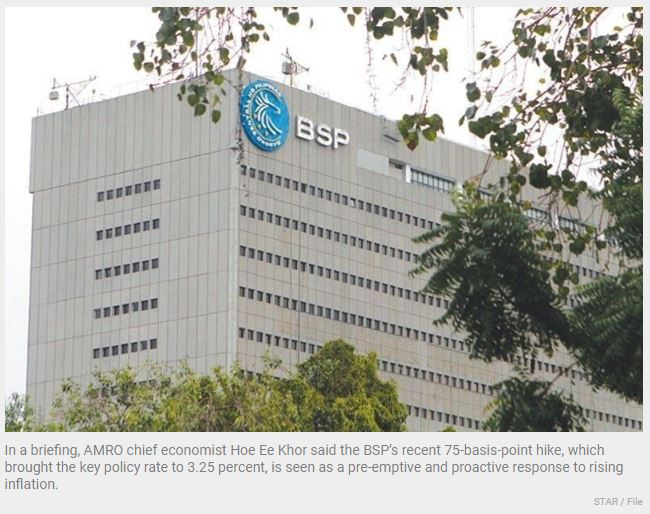Philippines: BSP has room to hike rates further – AMRO
MANILA, Philippines — The Bangko Sentral ng Pilipinas (BSP) still has room to continue raising key policy rates, following last week’s off-cycle rate hike, the ASEAN+3 Macroeconomic Research Office (AMRO) said.
In a briefing, AMRO chief economist Hoe Ee Khor said the BSP’s recent 75-basis-point hike, which brought the key policy rate to 3.25 percent, is seen as a pre-emptive and proactive response to rising inflation.
“They have hiked three times (since May) and it is now at 3.25 (percent). I think there is a bit more room to go given that the neutral rate is probably around four, four plus (percent),” he said.
The 75-basis point rate hike last week follows back-to-back rate hikes of 25 bps in May and June.
Khor said the BSP’s move to continue raising rates would depend on the inflation rate going forward.
“But we feel quite confident that if the economy is on track, there is no reason why it should not continue to normalize the interest rate,” he said.
“Because of high inflation, I think this sends a strong signal to the rest of the world that the central bank is determined to get inflation and bring it back up within the target band,” he said.
As of the first half, the country’s inflation rate averaged 4.4 percent, exceeding the BSP’s two to four percent target, after rising to 6.1 percent in June from 5.4 percent in May.
Given the supply disruptions from the Russia-Ukraine conflict, AMRO expects the country’s headline inflation to rise to 4.4 percent this year before declining to 3.8 percent next year.
Asked for an outlook on the country’s second quarter economic performance, AMRO economist Andrew Tsang said it might be a lower year-on-year figure compared with the 8.3 percent growth seen in the first quarter, because of the high base effect.
The Philippine economy grew by 12 percent in the second quarter last year.
AMRO expects the country’s gross domestic product to grow by 6.9 percent this year and moderate to 6.5 percent next year.
Tsang said the country’s economic recovery is expected to remain strong this year, with the private sector taking the lead in driving growth on the back of continued policy support.
AMRO expects legislative measures passed in the previous administration such as amendments to the Retail Trade Liberalization Act, the Public Service Act, and the Foreign Investments Act to help improve the business environment and encourage more investments into the country.
While AMRO is optimistic of growth in the country, Tsang said there are risks to the outlook including a potential outbreak of a more dangerous COVID variant, prolonged war between Russia and Ukraine, and a slowdown in China.
Given scarring effects caused by the pandemic which include learning losses from school closures, AMRO sees the need for the government to take action to avoid hurting long term growth.
In addition to continuing to normalize the monetary policy stance based on the strength of economic recovery and trajectory of inflation, AMRO recommends continued improvement in public spending programs, while enhancing revenue collection.
Matthew Yiu, group head and lead economist at AMRO, said the plan to tax digital transactions and single-use plastic are seen to have potential to improve revenues.
To minimize scarring, Tsang said fiscal consolidation should come with targeted support to hard hit sectors.
To achieve a more resilient and sustainable long term growth, AMRO also sees the need for efforts to continue to digitalize the economy.
“Authorities should continue with plans to digitalize the economy, upskill the workforce, and improve infrastructure,” Tsang said.
Source: https://www.philstar.com/business/2022/07/24/2197520/bsp-has-room-hike-rates-further-amro


 English
English




